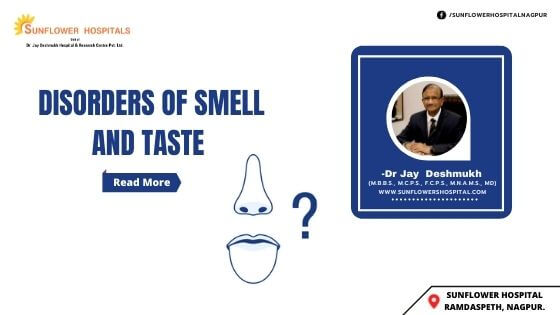Which nerves of the brain are responsible for our smell and taste function? Loss of smell is more common than loss of taste as multiple nerves coming out of the brain control our taste function. Smell depends upon the olfactory and trigeminal nerves, whereas taste depends on the functioning of facial, glossopharyngeal and vagus nerves. Local factors in the nose and oral cavity also influence these functions.
What are the common causes of impaired function of smell and taste?
Covid 19 infection should be rated the commonest in recent times. It was more common in hospitalised individuals than in mild cases. The deficiency of vitamins commonly Vitamin B 12, zinc, and iron can affect taste sensations. Malnutrition, thy. raid deficiency, diabetes, and kidney failure can influence these functions. Head injury, the aura in migraine headaches, ageing and toxic chemical exposure can affect these sensations.
What about the loss of smell?
In most Covid cases recovery took place in a few weeks, however, in some it took a few months. Common cold, leprosy and many other viruses and bacteria can be Dental operations, intraoral infections, gum infections, involvement of certain cranial nerves and a paralytic stroke especially of the frontal lobe can deprive you of taste sensations.
Can certain medications affect these sensations?
Certain antibiotics, anti-epilepsy drugs, antidepressants, certain other drugs used in mental illness, anti-cancer drugs, antithyroid drugs, statins, and certain drugs A normal sense of taste and smell allows us to appreciate the flavour and taste of the food that we eat and gives us immense satisfaction. It also warns us about toxins, fumes, stale food and other noxious substances.
Can we ever imagine the consequences of the disruption of this important neurological function?
responsible. Smoking, rhinitis and sinus infections, nasal allergies, damage to an olfactory nerve by a tumour, polyp, after radiation to the head are other important causes of loss of smell. Repeated use of nasal drops can affect the sense of smell.
What are the local cases of taste disorders?
used to treat blood pressure can impair taste sensations.
What about the elderly population?
Loss of smell and taste could be associated with degenerative conditions of the brain like Alzheimer’s disease. Loss of smell sensation in the elderly is associated with increased death rates.
What are the diagnostic tests?
Not all individuals require these tests. However, in a few, a thorough clinical examination, and examination of the head, neck, ear, and nose throat is important. Tests for Coronavirus, 812 deficiency, thyroid, diabetes, kidney function, liver function and a CBC are required. A CT scan of the sinuses and MRI of the brain in selected cases may be required.
How are these disorders treated?
Obviously, the treatment would depend on the diagnosis. However, those with altered tastes may have a tendency to consume excess salt and sweets. This may affect their general health. Proper treatment of nasal allergies, avoiding smoking and tobacco, and correction of anaemia and vitamin deficiencies may help. Zinc administration also helps. Formal dental evaluation and treatment may become necessary. Loss of smell and taste sensations immensely affect the quality of our life. Certain disorders are simple to diagnose and treat. However certain causes of loss of taste and smell can directly be related to certain major diseases of the brain or sinuses.


